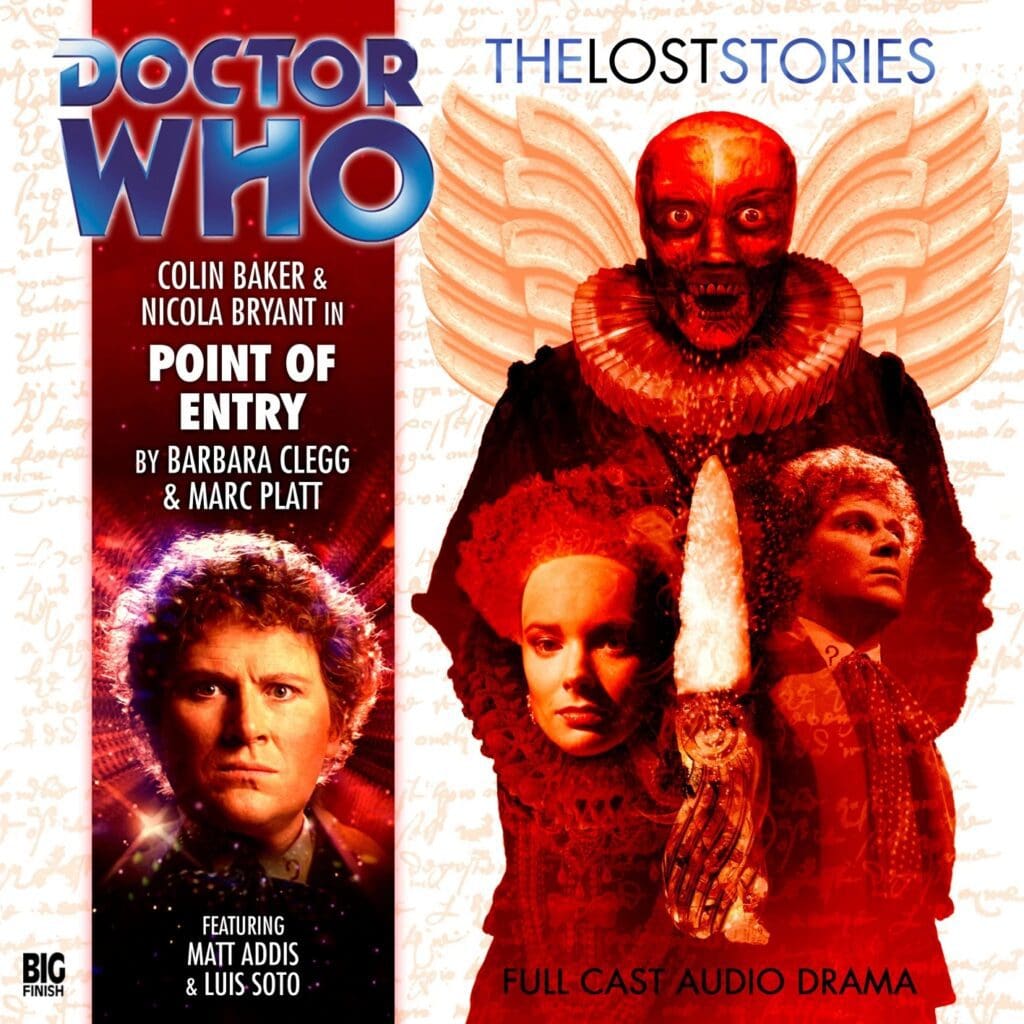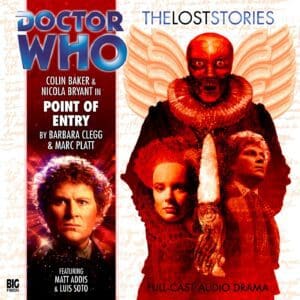
The Lost Stories S1 • Episode 6
Point of Entry
Sets:
The Lost Stories
Reviews and links from the Community
This review contains spoilers
Review of Point of Entry by thedefinitearticle63
This is part of a series of reviews of Doctor Who in chronological timeline order.
Previous Story: Paradise 5
It's amazing how exceedingly dull this story is. I'm honestly shocked, because looking at the summary of this story it sounds like it should be one of the strangest, most exciting lost stories. It doesn't seem like something that could have been concieved in the 80s, let alone actually made. This story just goes on and on and on. If it weren't for the two-hour runtime I don't think this would have been nearly as bad.
There are a few redeeming qualities. For one, the villain of the story is really entertaining to listen to, reminds me of Salazar from Pirates of the Caribbean. Nicola Bryant gives a great performance here and gets to show off her accent skills by playing Peri pretending to be a posh English queen.
Besides all that though, I found this story a slog to get through, albeit one with fascinating ideas.
Next Story: The Song of Megaptera
This review contains spoilers
Review of Point of Entry by deltaandthebannermen
Point of Entry is one of the more unusual entries in Big Finish’s Lost Stories range. Unlike The Nightmare Fair, Mission to Magnus or Song of the Space Whale, it was a story which I suspect few fans had ever heard of. It wasn’t ever included in the fabled Lost Season 23 run down detailed in various magazines and DVDs. It seems that Barbara Clegg, it’s writer, submitted a number of storylines to the production team sometime after she wrote Enlightenment, but none of them were taken up. Point of Entry is one of those. As such it stands out in the Lost Stories range as it doesn’t arrive with a bundle of preconceptions. Everyone thinks they know what The Nightmare Fair or Mission to Magnus would have been like had it been made. I suspect some fans were incensed that an unknown quantity was put into production over and above more famed lost stories such as The Ultimate Evil or the legendary Yellow Fever (and How to Cure it). Strip away these grumbles and preconceptions and Point of Entry stands as a strong story which both feels and doesn’t feel like something which could have been produced in the 1980s.
The idea of the Doctor and Peri meeting a historical figure in a period setting has precedence. The Mark of the Rani did this with the Industrial Revolution and George Stephenson. In tone, however, the Doctor and Peri’s visit to Elizabethan England and their encounter with Christopher Marlowe could not be more different.
Many of the cast make the point of saying how dark a script this is and they are correct. Human sacrifice, tongues cut out, flesh creeping over Velez emaciated form. It is difficult to picture these images being broadcast on BBC1 in the early evening. Audio, of course, allows for more visceral Doctor Who than we ever witnessed on television and, as Colin Baker says, it is to Point of Entry’s advantage that it wasn’t made in the 80s and gets the Big Finish treatment instead.
The concept of the Omnin as an alien race able to control and communicate through vibrations is an original one and the idea they have destroyed their own planet through uncontrolled vibrations adds an apocalyptic nature to their potential invasion of Earth. The fact that the Doctor initially wants to help them find an uninhabited world allows this side of the Doctor’s personality seen in stories such as The Silurians to come through his sixth incarnation – an aspect that is easily forgotten behind the ‘violence’ and antagonistic nature dominant on television.
Historically, the story plays with the idea that Marlowe, in researching ideas for his plays, particularly Doctor Faustus, has entered into an unholy pact with the Spaniard, Velez and is practising ‘the Dark Arts’. At the same time it includes the commonly held belief that Marlowe worked as a spy. As such the story includes Sir Francis Walsingham, ‘spymaster’ to Queen Elizabeth I. At base level we have houses, cellars, inns, dungeons, ships and streets all of which, through the marvel of Big Finish’s sound design, sound authentically Tudor.
Something that Point of Entry does very well is atmosphere. Even without visuals, it is incredibly easy to imagine the darkness pervading the Tudor houses and streets. Everything feels claustrophobic and threatening. When the characters traverse the astral plane (another element that audio does more favours to than some dodgy CSO in the 80s would have) the atmosphere changes to one of an arid expanse. The finale with Velez growing to enormous size and taking on the form of Quezacotl, the Aztec god (another effect saved from the 80s) does feel slightly at odds with the rest of the story’s tone but serves to be dramatic enough to make allowance for. It does also allow for a brilliant climax where the bells of London are all rung at the same time to defeat the Omnin.
The cast are excellent and of particular note is Nicola Bryant revelling in the chance to do some comedy with her performance as a fake Queen Elizabeth I. It is often easy to forget, when watching Season 22, how good an actress Nicola Bryant is when not forced to fulfil the stereotypical companion role (as seen in Timelash for example) or the argumentative relationship with the 6th Doctor which she and Colin Baker were only just escaping the shadow of at the beginning of Season 23. It’s often stated that Big Finish have done wonders for the 6th Doctor and Mel but it has also served Peri well, giving her a different slant to her character with the relationship between her and Erimem and then allowing her time with the 6th Doctor to become more of a believable friendship rather than the constant battle it seemed to be on screen.
Point of Entry is easily one of the strongest Lost Stories so far and is possibly my favourite alongside Leviathan (although when the competition is as dreadful as Mission to Magnus or The Hollows of Time it isn’t a hard contest to win).
This review contains spoilers
Review of Point of Entry by MrColdStream
6️⃣🔽 = PASSABLE: OKAY!
Thworping through time and space, one adventure at a time!
This time: mirror, mirror on the wall; who’s the evilest of them all?
The TARDIS performs an emergency landing, taking Sixie and Peri to Elizabethan England, where they get involved with a “Spanish wizard” trying to bring a nefarious other-dimensional force to Earth. It’s The Masque of Mandragora and The Talons of Weng-Chiang all over again!
It feels good to be back in this era, and the audio does a generally fine job of describing the people and traditions of the era while seamlessly hinting towards deeper sci-fi elements. The dialogue is of the Shakespearean kind we hear in stories such as The Crusade.
We meet playwright Christopher Marlowe and his friend Tom here, and they are quite colourful characters, with fun performances for Matt Addis and Tam Williams. Sixie sure likes to hang out with his writer pals!
Velez is quite enjoyable; a typically larger-than-life Doctor Who villain, but with an effective presence that looms over the listener and the other characters from the onset. He’s never too over-the-top, but always effectively villainous.
Part 1 is very talkative but doesn’t do much in terms of progressing the story or building tension. Baker and the guest cast keep it pretty believable, though. Peri goes off chasing a poor sacrificial victim and getting into trouble, while the Doctor slowly gathers information.
Peri’s troubles towards the end of Part 1 raise the stakes a bit for the second part of the story, and Nicola Bryant’s acting here sells the weight of the cliffhanger. We then follow Peri as she is stuck in a strange realm and the Doctor tries to locate and rescue her; there’s a lot going on in Part 2, yet things still remain a bit contained. The other dimension does add some tension though, especially when the Doctor finally faces the Omnim.
There's certainly many good ideas here—the invisible flies, the “magical” mirror, the Aztec treasure—it's just that the blend of the ideas doesn't make for very engaging audio.
One of the better parts of the audio is the sequence where Peri impersonates the Queen (and not being very good at it).
RANDOM OBSERVATIONS:
- This story has been adapted by Marc Platt from a 1.5-page story treatment by Barbara Clegg.
- The mute Jack is played by Alex Mallinson, who is better known as a cover artist for Big Finish.
- The inconsistent way the actors pronounce Velez’s name annoys me.
Community Ratings
(Updates coming soon:)
Add the last X members who rated it here
Add number of Favs, and who they are, here






